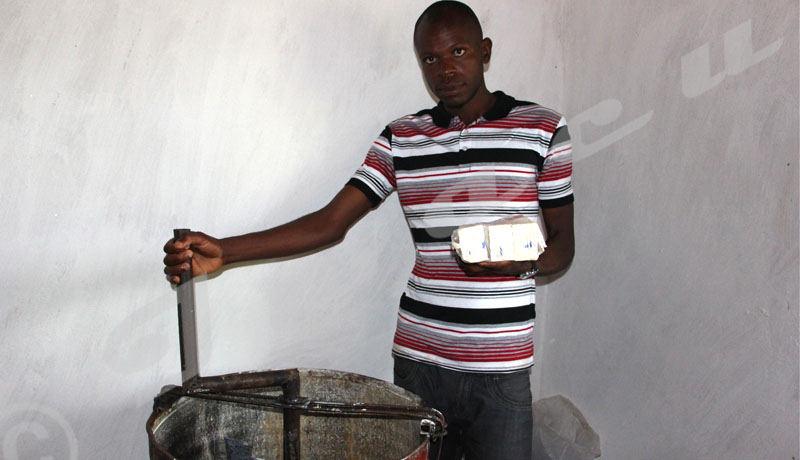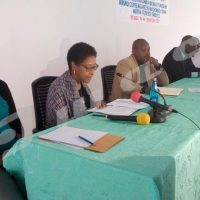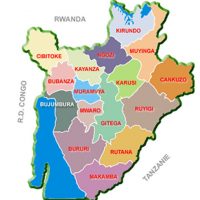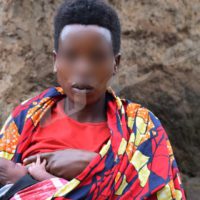Ligala, prostitution, poverty, unemployment and drug consumption are some of the challenges faced by young high school and university graduates from Matana commune in Bururi province. The Catholic Church has succeeded to gather unemployed youth into an association.

Samuel Sibomana: “It is not easy to have the finished product without sufficient materials.”
It is a huge relief for the unemployed youths of Matana commune in Bururi province. More than 160 young secondary school and university graduates have joined the Association for Integral Development and Community Initiatives Promotion (ADIPIC) to fight unemployment and poverty. Most of them had just spent more than three years without work.
Micheline Niyongere, secondary school graduate, could not afford to register at the private university. For two years, she had not found a job either. She has not hesitated to join this initiative to network with other unemployed youths: “Not only do I work in synergy with other young people to develop myself, but I have also been able to start my own project to trade in bananas thanks to the knowledge I gained from entrepreneurship sessions within the association,” she says.
This young girl calls on unemployed youths to work in associations. “It is high time young people changed their mentalities. There is no work in public institutions any longer,” she says.
Samuel Sibomana, ADIPIC Chairman says that young unemployed people from Matana commune face several challenges including ligala (gathering of young idlers), drug consumption, prostitution…. “Young people who have nothing to do spend all their time at the trading center instead of thinking about their future projects,” he says adding that girls either get into early marriages or adopt bad behaviors to get some money.
Significant financial and material resources required
In addition to income-generating activities such as small businesses (shops, cafeterias and canteens), the ADIPIC specialty is to produce solid soap made from palm nuts. After a month of activities, they produce 1000 pieces of soap a week. “A dozen of soaps costs BIF 5000 and a piece of soap is sold at BIF 500. The latter is bigger than those already sold on market,” says ADIPIC chairman.
A customer met at Matana market recognizes that the soaps produced by these young people are very much appreciated. “Not only are they bigger than those already on the market, but also they are of good quality,” he says.
Samuel Sibomana, ADIPIC chairman says the production of these soaps requires a lot of financial and material means. “The four barrels that we use were borrowed from an association that had tried to produce soaps but to no avail,” says Sibomana adding that they planned BIF 6 million for the equipment. He, however, says they were unable to collect this amount and resorted to a loan to begin with.
These young people started with a capital of less than BIF 2 million. “The members of this association come from nine small local associations of our commune and each group has contributed a sum amounting to more than BIF 100, 000,” he said.
Raw materials, especially palm nuts, come from Rumonge province and Nyanza-Lac commune “where a lot of palm oil grows”.
Catholic Church to rescue youth
These unemployed young people were able to gather into the association thanks to the support of the Catholic Church. Abbot Gervais Godoka, from Butwe parish in Matana commune, says the Catholic Church has decided to focus on youth since 2015. “We were having a lot of difficulties with these young people to promote the integral development of human beings.”
He says the Catholic Church has taken the initiative to bring together all the unemployed youth of Matana Commune to encourage them in entrepreneurship. “They were exposed to many difficulties that did not honor our community,” he says.
Different meetings with natives, administrative officials and Christians were organized to seek support. Notices have been read and posted in many places. And more than 350 unemployed young people responded to the call. “Unfortunately only 161 young people are involved in this fight against unemployment and poverty”, deplores Abbot Godoka.
He also says the Catholic Church is working with the administrative authorities and the Anglican Church to support these young people. Natives of the commune are also involved. “A university lecturer, native of the commune, offered to introduce these young people to entrepreneurship,” he says before adding that there is also a committee of wise people in charge of coaching and supervising the staff.
In addition, the chairman of the Communal Council has promised to pay for them the rent of the offices (BIF 160,000 per month) for five months.
ADIPIC also plans to create an entrepreneurship school, engage in agro-pastoral activities and produce chalk. “Our community has several schools that need pieces of chalk. It is an opportunity for these young people to produce them and supply the locality. The Anglican Church promised them a machine that produces chalks,” he says.
Abbot Gervais Godoka encourages these young people to work in synergy to share their experience. “Members of this association are of different grade levels and can help each other,” he says.
Agathe Nduwimana, administrator of Matana Commune says several meetings have been organized for young people to encourage them to create their own jobs. “More than 80% of the funds granted to communes (BIF 500 million) are directed to development activities undertaken by the population, including young people,” she says.
For her, this association helps the commune to supervise young people. Some of them had already adopted inappropriate behaviors.



















 IWACU Open Data
IWACU Open Data

